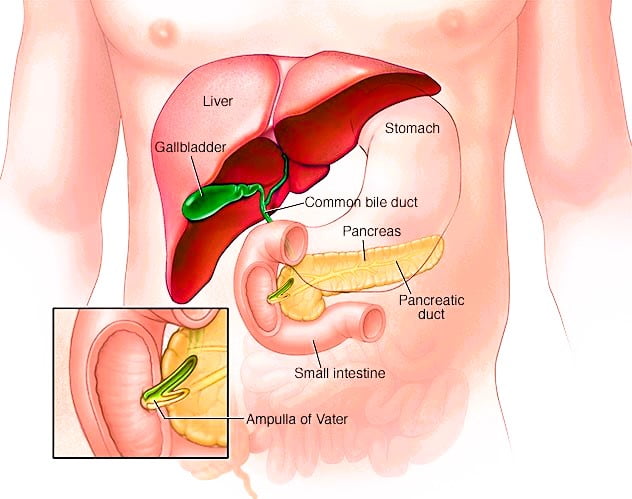Diagnosing Ampullary Cancer
Endoscopic Procedures
Endoscopy is a pivotal diagnostic tool for ampullary cancer. It involves inserting a flexible tube with a camera, known as an endoscope, through the throat to visualize the digestive system, including the ampulla of Vater. This procedure not only allows for direct observation but also facilitates tissue sampling for further analysis.
- Endoscopic Ultrasound (EUS): Utilizes sound waves to create images and is particularly useful in assessing ampullary cancer.
- Endoscopic Retrograde Cholangiopancreatography (ERCP): Involves injecting a dye into the bile or pancreatic ducts to highlight blockages on X-rays.
Imaging Techniques
Various imaging tests provide a comprehensive view of ampullary cancer, revealing its location and size, and whether it has metastasized.
- Magnetic Resonance Cholangiopancreatography (MRCP): Offers detailed images of the bile and pancreatic ducts.
- Computed Tomography (CT) Scan: Provides cross-sectional images of the body.
Biopsy
A biopsy involves extracting tissue samples to confirm the presence of cancer. These samples undergo laboratory testing to identify cancer cells and gather more information to guide treatment planning.
Treatment Approaches for Ampullary Cancer
Surgical Interventions
Surgery is often the first line of treatment, with the approach tailored to the cancer’s size and the patient’s health.
- Whipple Procedure (Pancreaticoduodenectomy): A complex surgery that removes the head of the pancreas, part of the small intestine, gallbladder, and bile duct.
- Endoscopic Surgery: Suitable for small cancers, this minimally invasive technique uses endoscopic tools for tumor removal.
- Stent Placement: Aimed at alleviating jaundice, this procedure involves inserting a stent to ensure bile flow.
Adjuvant Therapies
Depending on individual cases, chemotherapy and radiation therapy may be employed either before or after surgery to eradicate remaining cancer cells and reduce the risk of recurrence.
Additional Treatment Options for Ampullary Cancer
Chemotherapy and Radiation Therapy
- Combined Approach: Utilizing both chemotherapy and radiation therapy can enhance the effectiveness against ampullary cancer. This combination may be administered preoperatively to shrink the tumor or postoperatively to eliminate residual cancer cells.
Chemotherapy
- Stand-Alone Treatment: In cases of advanced ampullary cancer or post-surgery, chemotherapy may be employed as a sole treatment to impede cancer progression.
Targeted Therapy
- Precision Medicine: Targeted therapy involves drugs that specifically attack cancer cell markers, leading to cell death. This method is reserved for metastatic or recurrent ampullary cancer under certain conditions.
Immunotherapy
- Immune System Activation: Immunotherapy boosts the body’s natural defenses to detect and destroy cancer cells. It’s considered for advanced cases or when cancer returns, subject to specific criteria.
Palliative Care: Enhancing Quality of Life
Palliative Care: This specialized medical care focuses on providing relief from the symptoms and stress of a serious illness like cancer. The multidisciplinary team aims to improve the quality of life for both the patient and their family. Palliative care can be integrated with other aggressive cancer treatments to provide comprehensive support.
By incorporating palliative care, patients may experience improved well-being and potentially extended survival times alongside their primary cancer treatments.
Coping with Ampullary Cancer: Strategies and Support
Gaining Knowledge and Making Decisions
Educating yourself about ampullary cancer is crucial. Understanding your condition, test results, and treatment options can empower you to make informed decisions about your care.
Maintaining Relationships
Strong connections with friends and family are invaluable. They provide not just practical support, such as home care during hospital stays, but also emotional support to help you navigate the challenges of your diagnosis.
Seeking Emotional Support
Having a trusted person to discuss your hopes and fears can be therapeutic. Whether it’s a loved one or a professional like a counselor, social worker, or support group member, open communication is key.
Utilizing Resources
The National Cancer Institute and the American Cancer Society are excellent sources for support group information and additional guidance.
Preparing for Your Medical Appointment
Steps to Take Before Your Appointment
- Understand Pre-Appointment Restrictions: Confirm if you need to follow any specific instructions before your appointment, such as dietary restrictions.
- Document Your Symptoms: Keep a detailed record of your symptoms, even those that may not seem directly related to your cancer.
- Personal Information: Write down any significant personal stressors or life changes.
- Medication List: Make a comprehensive list of all medications, vitamins, or supplements you’re taking, including dosages.
- Bring Support: Consider having a family member or friend accompany you to help remember the details discussed during the appointment.
Questions for Your Healthcare Team
Prepare a prioritized list of questions to ask, such as:
- The likely cause of your symptoms
- Possible alternative causes
- Required tests
- Recommended treatment plans
- Management of other health conditions alongside cancer
- Any necessary lifestyle restrictions
- The need for specialist consultation
- Availability of educational materials and recommended websites
What Your Doctor May Ask
Be ready to provide information about:
- The onset of your symptoms
- The frequency and intensity of your symptoms
- Factors that alleviate or exacerbate your symptoms
| Category | Key Points |
|---|---|
| Overview | Rare cancer at the ampulla of Vater, affecting nearby organs, treated with surgery, radiation, and chemotherapy. |
| Symptoms | Jaundice, diarrhea, clay-colored stools, abdominal pain, fever, blood in stool, nausea, vomiting, weight loss. |
| Diagnosis | Endoscopy, endoscopic ultrasound, endoscopic retrograde cholangiopancreatography, imaging tests, biopsy. |
| Treatment | Surgery (Whipple procedure, endoscopic surgery, stent placement), chemotherapy, radiation, targeted therapy, immunotherapy. |
| Palliative Care | Specialized care to improve quality of life, manage symptoms, and provide support alongside other treatments. |
| Coping and Support | Educate oneself, maintain close relationships, seek emotional support, use resources like support groups and cancer organizations. |
| Preparation for Appointment | Note symptoms and personal information, list medications, bring support, prepare questions, expect to discuss symptoms with the doctor. |


